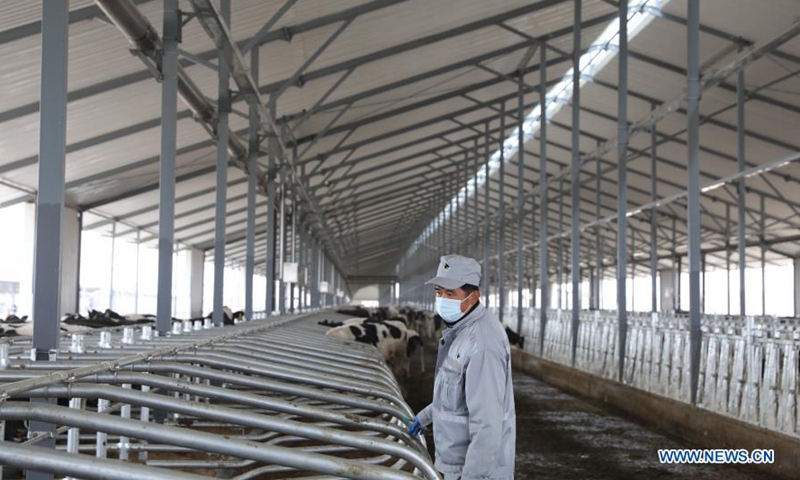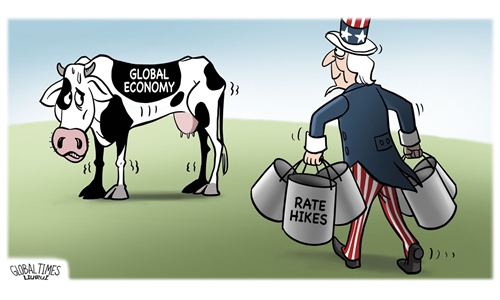Chinese localities step up efforts to support dairy farmers amid tough market conditions

A staff member works at a cattle breeding company in Wuwei City, northwest China's Gansu Province, Nov. 17, 2020. In recent years, Wuwei City has gone to great lengths to develop husbandry industrial clusters, covering the area of forage grass cultivation, cattle breeding, meat and dairy products processing and so on, which optimizes resources allocation and increases the locals' income. (Xinhua/Du Zheyu)
Chinese animal husbandry associations and dairy industry associations have stepped up efforts to support dairy farmers and resolve the difficulties facing the industry, according to the Dairy Association of China (DAC).
In the latest move, officials from husbandry associations and dairy industry associations in East China’s Shandong Province and North China's Shanxi Province have had meetings with companies in the industry. The officials urged dairy enterprises to collect dairy products from farmers at full capacity and for breeding farms to do a good job of breeding management, to effectively reduce costs and improve quality and efficiency.
The Chinese dairy industry is facing oversupply pressure due to a decline in consumption and prices which has led to overstocking of milk products, according to the DAC.
Chinese dairy farmers are facing large losses due to a sharp decline in market demand because of excess supply, according to industry insiders on Monday, with some farmers reportedly "dumping milk" or even "slaughtering cows" to cope with the difficulties.
However, cases of farmers dumping milk or slaughtering cows are very rare at the moment, some dairy farmers and industry analysts told the Global Times. Meanwhile, local officials have taken measures, including offering subsidies, to support dairy farmers.
An employee of a dairy farming company based in Shanhe City, North China's Hebei Province, told the Global Times on Monday that the situation of pouring away milk or terminating cows has not happened yet in his company, adding that the business has been encountering difficulties with fewer contracts and lower prices.
The situation of "pouring away milk" or "slaughtering cows" has not happened yet but farmers may be approaching a tipping point, Song Liang, a Beijing-based dairy industry expert, told the Global Times on Monday, adding that it would not become a common phenomenon even if it happens and farms will not slaughter young and strong cows.
News and pictures of farmers draining milk had been widely circulated on Chinese social media, after the Beijing Business Daily reported, citing a dairy farmer from Suzhou, East China's Anhui Province, that some major milk production hubs in northern China, including Hebei and North China's Inner Mongolia, have seen shown signs of farmers "dumping milk" or "slaughtering cows."
The dairy farmer surnamed Li said that the current forage cost for one cow is about 80 yuan ($11.8), and a ranch raising dozens of cows would face a loss of hundreds of thousands of yuan due to tepid market demand. As the result, farmers have to slaughter cows to sell beef to offset losses, according to Li.
Li said that farmers can't make much from the price of 3.85 yuan per kilogram (kg), especially as cows consume a relatively higher-price forage compared with beef cattle, but cows have less meat for the same weight of cattle. Therefore, pastures and farms still face losses even if they sell cows as cattle.
Local officials and industry leaders in Hebei have moved to tackle to the problems and support farmers.
The reference price for raw milk trading in the first quarter of 2023 in Hebei is 4.1 yuan per kg with a minimum of 3.93 yuan per kg. In view of the current situation, the price will be lowered to 3.85 yuan per kg and dairy firms should collect as much as possible and compensate the price difference after the difficulties ease, the provincial industry association said on December 29.
Song noted that dairy enterprises have been cooperating with farms and pastures despite a continuous drop in prices, while the operational costs are expected to fall in 2023 after the previous surge in forage like corns due to global inflation. He noted that the stagnant market conditions are still hitting small and medium-sized companies in particular.
China's raw milk prices are determined by supply and demand for mid- to high-end dairy products, which are currently in a phase of overcapacity due to a weak consumer market, according to Song.
He added that the demand for mid- to high-end dairy products has declined significantly in the past two years, and the decline has caused consumption to drop, triggering a phased excess of supply over demand and falling prices for raw milk.
Responsible authorities have also been implementing supportive measures, aiming to ease the burden for dairy farmers and relevant firms.
Local agricultural authorities in Hebei released two notices on Friday, aiming to issue targeted funds and subsidies ahead of schedule and maintain the order of raw milk purchases.
Data from the National Bureau of Statistics showed that 28.489 million tons of dairy products were produced from January to November 2022, with production up 2.8 percent year-on-year.
Global Times

